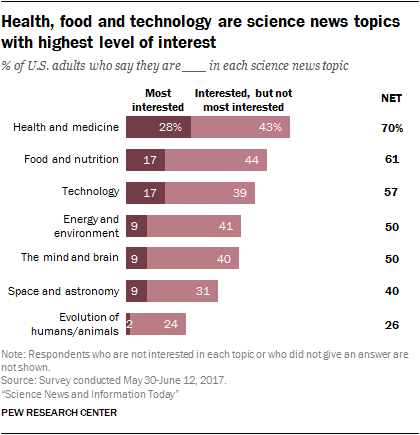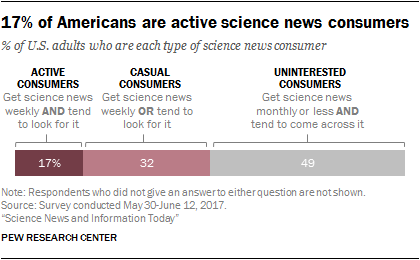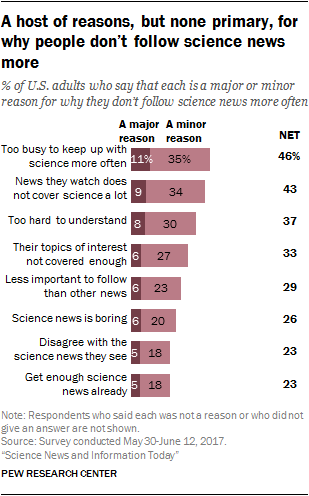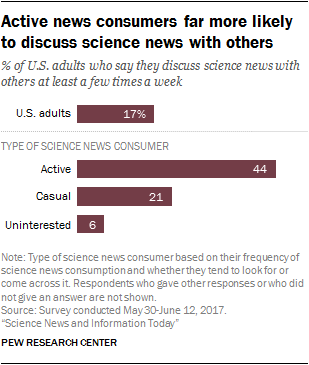About seven-in-ten Americans express at least some interest in science news – in fact, they report greater interest in science stories than news about business, entertainment and even sports, though more report interest in local and government news.
But regardless of interest levels, a minority (36%) of the public gets science news regularly, and most encounter it by chance rather than actively searching for it. Taken together, one-in-six adults (17%) both get science news regularly and seek it out, whereas about half (49%) get science news infrequently and primarily happens upon it.
Most Americans have at least some interest in science news, though only one-in-four are very interested
 Science news garners a fair amount of interest among Americans. About seven-in-ten (71%) have at least some interest in the news topic, though far fewer (25%) say they are very interested.
Science news garners a fair amount of interest among Americans. About seven-in-ten (71%) have at least some interest in the news topic, though far fewer (25%) say they are very interested.
Overall, of the news topics asked about, interest in science falls somewhere in the middle. More Americans are very interested in local (41%) and political news (30%) than are very interested in science news, but science outpaces business (18%), sports (17%) and entertainment news (10%).
These findings track with previous Pew Research Center surveys in 2016 and 2014 as well as surveys on behalf of the National Science Board.7
Additionally, about half of Americans (52%) express enjoyment in science news over other topics, — though only 8% say they do a lot more.
Within science news, Americans are most interested in health and medicine
 Science spans a wide range of subject areas. Of seven specific science topics asked about, five of them garner interest from at least half of Americans. But one stands out from the others: health and medicine. Seven-in-ten Americans express interest in health and medicine, with nearly three-in-ten (28%) rating it as the science news topic they are most interested in.
Science spans a wide range of subject areas. Of seven specific science topics asked about, five of them garner interest from at least half of Americans. But one stands out from the others: health and medicine. Seven-in-ten Americans express interest in health and medicine, with nearly three-in-ten (28%) rating it as the science news topic they are most interested in.
Health and medicine is followed by food/nutrition and technology – each chosen as the most interesting topic by 17% of U.S. adults. Fewer name energy and environment, the mind and brain, and space and astronomy as the topic that interests them most (9% each), while just 2% say this of evolution and 1% mention some other science topic.
Overall, the vast majority of Americans express interest in at least one of the seven specific science news topics. But when asked about the science news they get, about half (49%) say they follow just a couple of science news topics.
Interest in science news higher among men and the more educated
Across demographic groups, the higher educated and men exhibit greater levels of interest in science news. About four-in-ten (38%) of those with postgraduate degrees and 32% with college degrees are very interested, compared with a quarter or less of those who have some college education or less. Men are also more likely than women to be very interested (30% vs. 20%).
Differences emerge as well in interest in the specific science news topics. Women are more likely to be most interested in health, nutrition and the mind, whereas men favor technology and astronomy. Younger Americans are more likely to show an affinity for technology, whereas their elders prefer health-related subjects. Those with at least college degrees are more likely to name technology as their favorite topic. And while Democrats and Democratic-leaning independents are somewhat more likely to say energy and environment is a science topic of interest to them, few in either party consider this a topic of “most interest” (11% of Democrats/leaning Democrats and 6% of Republicans/leaning Republicans). For more details see Appendix A.8
About one-in-six adults (17%) actively seek out science news and consume it at least a few times a week; most get science news infrequently and happen upon it
 While most Americans show at least some interest in science news, this doesn’t translate into high levels of active science news consumption.
While most Americans show at least some interest in science news, this doesn’t translate into high levels of active science news consumption.
The survey examined the intensity of science news consumption in two ways – frequency of consumption and whether people seek it out. The results show that a greater portion of Americans tend to be more passive than active in their science news habits.
Most Americans are not frequent consumers of science news. About two-thirds (64%) get news about this topic a few times a month or less. The remaining 36% get news more often, with just one-in-ten doing so nearly daily.
And when Americans do get science news, most do so by happenstance. Nearly seven-in-ten (68%) get their science news mostly because they happen to come across it, while three-in-ten mostly do so because they look for it. Americans tend to be more passive in how they get science news than they are about news more generally; a 2016 Pew Research Center report found that when Americans are asked about how they get their online news, 44% said they mostly seek out their news online, whereas 55% mostly happen upon it.

 Taken together, a minority of Americans (17%) are what can be termed “active science news consumers,” those who seek out science news and get it at least a few times a week. About half (49%) of U.S. adults, on the other hand, are “uninterested science news consumers” – they get science news infrequently and mostly come across it. The remaining 32%, the “casual science news consumers,” fall somewhere in the middle; they either frequently get science news or seek it out, but not both.
Taken together, a minority of Americans (17%) are what can be termed “active science news consumers,” those who seek out science news and get it at least a few times a week. About half (49%) of U.S. adults, on the other hand, are “uninterested science news consumers” – they get science news infrequently and mostly come across it. The remaining 32%, the “casual science news consumers,” fall somewhere in the middle; they either frequently get science news or seek it out, but not both.
Similar to interest levels, the two demographic groups that stand out for being somewhat more likely to be active science news consumers are men and the more educated. About a quarter of those with postgraduate degrees (27%) and those with college degrees (24%) are active consumers, compared with 16% of those with some college education and about one-in-ten (11%) of those with high school diplomas or less.
Men are also more likely than women to be active consumers (22% vs. 12%, respectively), consistent with their higher level of interest.
There are no differences by age or political party identification in the share of active science news consumers, though Republicans and independents who lean to the GOP are slightly more likely to be uninterested science news consumers than are their Democratic counterparts.
 Curiosity is a key driver for why people get science news; most parents cite children’s interests as a reason
Curiosity is a key driver for why people get science news; most parents cite children’s interests as a reason
When U.S. adults are asked about why they follow science news, curiosity outpaces any other reason. About eight-in-ten adults (81%) cite their curiosity about what’s happening in science as a reason that they follow news on the topic, with 39% saying it’s a major reason.
 Other reasons cited by smaller majorities are that science news helps them make decisions about their everyday lives and that they enjoy talking about science with others. Additionally, parents tend to cite their children’s interests and activities as a reason; some 61% of parents with children under 18 say this, with nearly a quarter (24%) saying it’s a major reason they follow science news.
Other reasons cited by smaller majorities are that science news helps them make decisions about their everyday lives and that they enjoy talking about science with others. Additionally, parents tend to cite their children’s interests and activities as a reason; some 61% of parents with children under 18 say this, with nearly a quarter (24%) saying it’s a major reason they follow science news.
Overall, more called each of these a “minor” rather than a “major” reason they follow science news.
On the flip side, there are many factors that discourage Americans from following science news more often. Though, of eight possible reasons asked about, none is cited by a majority as even a minor reason. The two most common reasons why people don’t follow science news more frequently are that they are too busy (46%) or because the sources they regularly follow don’t cover science a lot (43%).
Science news is not a particularly social experience
 Few Americans have regular discussions about science news topics with their friends, family and acquaintances. The majority of Americans (55%) say they discuss science news less than a few times a month, while just 14% do so a few times a week and 3% do daily. This finding is in line with the fact that only a minority of adults actively consume science news.
Few Americans have regular discussions about science news topics with their friends, family and acquaintances. The majority of Americans (55%) say they discuss science news less than a few times a month, while just 14% do so a few times a week and 3% do daily. This finding is in line with the fact that only a minority of adults actively consume science news.
Americans seem to discuss science news with others less than they do other forms of news. A 2016 Pew Research Center report found that 73% of Americans discuss news generally – whether about science or some other topic – at least a few times a week. And in March 2016, nearly six-in-ten (59%) U.S. adults said they had talked about government and politics with others at least a few times a week.
Additionally, most people who discuss science news with some regularity (i.e., “at least a few times a month”) do not consider themselves drivers of these conservations. Nearly two-thirds, 63%, of those who discuss science news at least a few times a month say they usually listen more than lead conversations about science news, while only 36% of this group says they see themselves as leading these conversations. Similarly, more than half (54%) of those who discuss science news at least a few times a month say they typically turn to others for science news, compared with 44% of this group who say that others typically turn to them for science news.
Active science news consumers much more likely to enjoy science news, cite a number of reasons for following it, and talk about it with others
Active science news consumers stand out for their high interest in science news and the ways they consume it. An overwhelming majority (88%) of active science news consumers say they enjoy following science news more than other types of news; this compares with 63% of casual consumers and just one-third (33%) of the uninterested consumers.
Active science news consumers are especially likely to cite curiosity as a motivating factor for following science news; nearly every active consumer (97%) cites it as a reason, with 77% saying it’s a major reason. And most say they follow science news about a lot of different science topics.
 Finally, this group is particularly likely to have conversations about science news. Fully 44% of active science news consumers report talking about science news with others at least a few times a week, about twice that of casual consumers (21%) and far more than the uninterested science news consumers (6%). This group of active consumers is also much more likely to see themselves as the drivers of these conversations. Most active science news consumers who discuss science news with some regularity (61%) say that others turn to them for science news — in contrast to 42% of casual and 29% of uninterested science news consumers who discuss science news at least a few times a month. Similarly, about half of active science news consumers who discuss science news with some regularity (47%) say they lead more than listen in these conversations, compared with 35% of casual and a quarter (25%) of uninterested science news consumers who have these conversations at least a few times a month.
Finally, this group is particularly likely to have conversations about science news. Fully 44% of active science news consumers report talking about science news with others at least a few times a week, about twice that of casual consumers (21%) and far more than the uninterested science news consumers (6%). This group of active consumers is also much more likely to see themselves as the drivers of these conversations. Most active science news consumers who discuss science news with some regularity (61%) say that others turn to them for science news — in contrast to 42% of casual and 29% of uninterested science news consumers who discuss science news at least a few times a month. Similarly, about half of active science news consumers who discuss science news with some regularity (47%) say they lead more than listen in these conversations, compared with 35% of casual and a quarter (25%) of uninterested science news consumers who have these conversations at least a few times a month.


